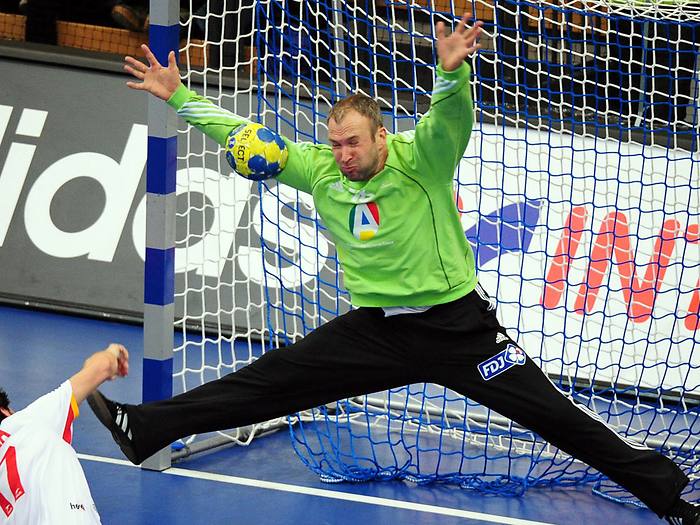Thierry Omeyer’s key role in the successes of France is well-known. And it is generally understood that a strong goalie performance can be the key to the outcome in any given game. So it can be instructive to analyze the goalie performance of some of the top teams in the World Championship.
Most observers recognize that the goalkeeper coming closest to Omeyer’s steadiness and spectacular performances in recent years is Szmal from Poland. This time he had less support than usual from his teammates, as Poland was hard hit by injuries both before and during the Championship. Bielecki’s comeback is amazing, but he is not back to his dominant form. Generally speaking, the Polish team at times looked heavy-footed and sluggish, and their final position as number 8 was rather telling. But things would have been worse had it not been for Szmal’s fantastic performances in some of the games.
The most exciting young new goalie is undoubtedly Niklas Landin of the Danish team. He may not yet be absolutely steady, as shown in the final, where he had been replaced in the early stages and then came back in and almost turned the game around single-handedly. He has already been signed up by Rhein-Neckar-Loewen from the 2012-13 season. It is interesting to note that both Szmal and Landin are part of the ‘stable’ of young and older goalies who are getting special training by the Swedish goalkeeper guru Claes Hellgren.
A big surprise was caused by the young Swedish goalie Niklas Sjoestrand, who is the second choice goalie for Barcelona but just barely made it onto the Swedish squad. He narrowly beat out the veteran Beutler for the second slot and was seen as back-up for spot duty behind Mattias Andersson. But some absolutely fantastic performances, especially against Poland and Croatia, quickly made him the top choice. When other Swedish key players wavered or were injured, it was Sjoestrand who came through. While he may not quite have matched Omeyer in the semi-final, he deserves credit for keeping Sweden in that game.
Another young Nordic goalie is Gustavsson from Iceland, who plays club handball in relative obscurity in Switzerland. When he had top performances, then the Icelandic team looked almost invincible. But when he was more ‘human’ then the team was a rather pale copy of the ‘viking’ style and attitude so often displayed in recent years. The veteran Ege in goal for Norway had a similar Championship. Being perhaps a bit more steady, he nevertheless oscillated between fantastic and more average. What was noticeable in the case of both Norway and Iceland was the lack of a solid back-up in net.
A surprisingly mediocre goalkeeper performance may have contributed to the relative lack of success for Croatia this time. By contrast, the surprising performance of Argentina, the only non-European team in the main round, has a lot to do with the amazing job of their goalkeeper Schulz, who has had an anonymous existence in the Spanish second division. One would imagine that more lucrative offers in a fancier setting will now await him.
Spain started out in a rather feeble fashion in the earlier stages where they did not really look like a medal contender. The whole team seemed mediocre and uninspired at times. On paper, Sterbik and Hombrados should have constituted a strong goalkeeper combo, but it was not until late in the event that Sterbik finally showed his abilities and helped his entire team lift itself a couple of notches. In particular, he was instrumental in securing a win in the bronze medal game.
Finally, another team with a strong combo was Germany. Both Bitter and Heinevetter had games where they looked brilliant, although sometimes their top form seemed to hold up for only part of a game. But one thing is clear, the final ranking of the disjointed and listless German squad could have been even worse without their generally strong goalkeeping.
